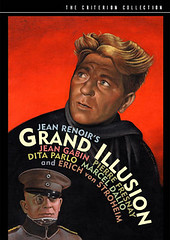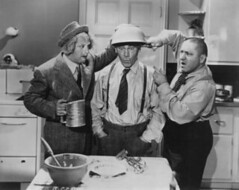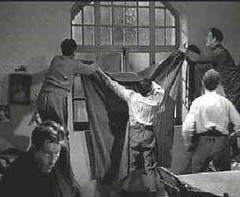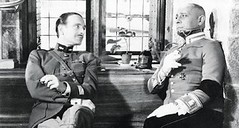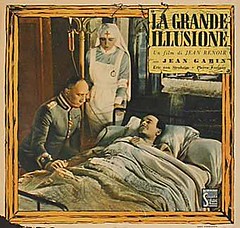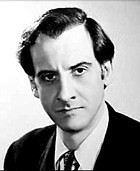GRAND ILLUSION
Your June 2008 Random Movie Club Results Are In!
Tagline: None
Preshow Entertainment: The Three Stooges
PRESHOW ENTERTAINMENT:
In 1934, after two years of remaining "uncredited" in films and then being featured in a Leon Errol short and as a chorus girl in MOULIN ROUGE, Lucille Ball finally did something of major importance. She appeared in a Three Stooges short. RMCer Steven had just asked "Has anyone famous been in a Three Stooges movie?" And, with the comic timing of a slap in the face or a broom handle to the eye, there she was.
In tonight's selections, THREE LITTLE PIGSKINS, DIZZY DETECTIVES and SOCK-A-BYE BABY, the Stooges are mistaken for football players, must find and stop a gorilla, and care for a baby left on their doorstep by a woman with questionable judgment. I mean, out of everyone in the world, who'd leave their infant with the Stooges? Unless her only two choices were the Stooges or Andy Dick.
There may be no better entertainment in the world than three guys slapping each other and referring to each other as "applehead" and "grapehead." "Porcupine" ain't bad either. The Three Stooges rock, and so does Random Movie Club. I mean, how many venues have The Three Stooges open for Jean Renoir's GRAND ILLUSION?
Here's some Hollywood for you. At one point, the boys are panhandling on the streets. I spotted the address, 6317 Yucca. I believe that's now a Scientology building.
AND NOW, OUR FEATURE PRESENTATION:
When I worked in home video back when there was such a business, people rented GRAND ILLUSION over and over again. They'd tell me it was a classic film. Some went so far as to call it the best movie ever made. But I was secretly thinking it's not; it's a guilty pleasure album by Styx, you pompous bastard. Still, I taped it off of Bravo (back then they didn't have commercials...and when we used tape) and of course, never watched it. But once again, as it recently did with Cocteau's BEAUTY AND THE BEAST, RMC gave me something I should have seen decades ago when people told me to. But the French have a saying; the hungrier you are, the better the food tastes.
A magnificent yet subtle epic, GRAND ILLUSION is unlike other POW movies we've screened at RMC, like STALAG 17 and THE GREAT ESCAPE (though there's a scene in GREAT ESCAPE lifted right from the dirt-lined pockets of GRAND ILLUSION). This time, it's WWI French and English officers in a POW camp who are slowly digging their way out.
I'm not going to go into too much plot this time. One reason is because the plot isn't very important. There are no kidnappings or time bombs. No suspense. No real action. GRAND ILLUSION is an internal film. It's about the human condition. This is a movie about people.
French pilots Marechal and Boeldieu are shot down by Captain Rauffenstein. But instead of waterboarding them, Rauffenstein invites the captured officers to dine with him, his cordiality most likely the result of his aristocratic background. Boeldieu is himself of high station, and in the very first moments of the movie these two are less enemies than WWI BFFs. Such is the unwritten code of respect among the upper class. If only people on the 405 had that sort of respect. But anyway...
Rauffenstien (a rich performance by Erich von Stroheim) leaves to fight more war as Marechal and Boeldieu are shipped to a POW camp for officers. It is here that they become friends with another prisoner, Rosenthal.
Continuing with the theme of respect, they find themselves in a camp that's more "summer" than "POW," with amenities ranging from the small, like toilets, to big things like their ability to launch full scale theater productions so big you'd expect them to go to the Sardi's in Dresden afterwards to wait for the reviews. Perhaps there were camps such as these, but it certainly seems a little too playful. In spite of this, the theater scene is wonderful. Though it's a vaudevillian/Moulin Rouge-y show with the men in drag, it's more than that. When the first man comes out in a dress, a hush falls over the whole room. They've not seen a woman in a long time. Even the Germans. It's good for a chuckle yet also an important moment, for as they wallow in the conviviality, news of a French town being taken back from the Germans reminds us...it's war.
Some of the prisoners, including Boeldieu and Marechal, are thrown a curve ball when they find themselves transferred to another camp before their tunnel is finished. This new camp is run by Rauffenstein, who is saddened to see the officers again. But he'll do everything he can do to accommodate them.
Of all the characters in the film, no two are more alike than Boeldieu and Rauffenstein, who is now reduced to bureaucratic grunt due to his burns, silver kneecap and fractured spine. On opposing sides, they're the anti-Valjean and Javert. When they meet up this second time, Rauffenstein proffers a handshake rather than a salute. He also commands his soldiers not to check Boeldieu's side of the room during an inspection. He trusts Boeldieu to tell him if there is anything against regulations in the room. But soon one of them will sever that respect, and the other man will himself become broken.
In one of the film's most sentimental moments, Rauffenstein tells Boeldieu "Believe me, I don't know who is going to win this war...whatever it is will be the end of the Rauffensteins and the Boeldieus." And Boeldieu agrees. The war seems to have trivialized and perhaps even destroyed the upper class. This is not the first time this classism has shown up. Earlier, there's a great moment when the prisoners lightheartedly discuss which classes get which diseases. Class is also explored among the prisoners themselves (aristocrat Boeldieu, Marechal the blue collar mechanic, and Rosenthal the rich Jew). Also, several times we're shown the prisoners having a better time than the guards.
Renoir breaks all sorts of rules of the game of filmmaking, though admittedly they're minor. But maybe he wasn't breaking them as much as making them. A lot of these "rules" weren't in place yet, and so what if they were? Some rules were certainly meant to be broken. That's what makes films like these so original. For example, where most movies would have a third act where the heroes beat the bad guys, GRAND ILLUSION segues into almost an entirely different movie. The tone changes, and so do some characters. And it's magical.
The characters in GRAND ILLUSION speak in their native tongues (French, German and even English), creating even more realism. It's refreshing (especially from a 1937 film, clearly ahead of its time) to have one character translate for another, instead of everyone speaking English. And the camera work is, well, work, with every shot's movement and composition neatly planned. You don't have to spend a quarter of a million dollars at NYU's film school to realize that Renoir's directing skills are incredible.
GRAND ILLUSION was the first foreign film to be nominated for an Academy Award (it lost to Capra's YOU CAN'T TAKE IT WITH YOU), but is it the greatest film ever made? Well, that's a silly question, for as one may claim THE GODFATHER, another THE MANCHURIAN CANDIDATE and another PRIVATE SCHOOL FOR GIRLS, the answer to that question beats in our individual hearts. Do I think GRAND ILLUSION is the greatest film? No. It sure is a wonderful and important film, one that should be seen by everyone. In fact, if the people responsible for starting wars watch this movie first, they may change their minds (that may be my own personal grand illusion).
Movies like SAVING PRIVATE RYAN and earlier entries such as ALL QUIET ON THE WESTERN FRONT show you the horrors of war right there on the screen. But GRAND ILLUSION may win the award for being a war film with the least amount of blood (none) and guts (also none). Yet its message is clear. In war, anyone can break and everyone stands to lose. The last line of the film? "We must finish the war, and let's hope it's the last." Grand illusion indeed.
Here's a really fascinating fact about the importance of this film. From IMDB:
Goebbels made sure that the film's print was one of the first things seized by the Germans when they occupied France. He referred to Jean Renoir as "Cinematic Public Enemy Number 1". For many years it was assumed that the film had been destroyed in an Allied air raid in 1942. However, a German film archivist named Frank Hansel, then a Nazi officer in Paris, had actually smuggled it back to Berlin. Then when the Russians entered Berlin in 1945, the film found its way to an archive in Moscow. When Jean Renoir came to restore his film in the 1960s, he knew nothing of Hansel's acquisition and was working from an old muddy print. Purely by coincidence at the same time, the Russian archive swapped some material with an archive in Toulouse. Included in that exchange was the original negative print. However, because so many prints of the film existed at the time, it would be another 30 years before anyone realised that the version in Toulouse was actually the original negative.
Tags: random movie club, grand illusion, the three stooges, erich von stroheim
Tagline: None
Preshow Entertainment: The Three Stooges
THE CLASSIC FRENCH FILM GRAND ILLUSION HITS THE RMC SCREEN. AND IT'S ABOUT TIME
PRESHOW ENTERTAINMENT:
In 1934, after two years of remaining "uncredited" in films and then being featured in a Leon Errol short and as a chorus girl in MOULIN ROUGE, Lucille Ball finally did something of major importance. She appeared in a Three Stooges short. RMCer Steven had just asked "Has anyone famous been in a Three Stooges movie?" And, with the comic timing of a slap in the face or a broom handle to the eye, there she was.
In tonight's selections, THREE LITTLE PIGSKINS, DIZZY DETECTIVES and SOCK-A-BYE BABY, the Stooges are mistaken for football players, must find and stop a gorilla, and care for a baby left on their doorstep by a woman with questionable judgment. I mean, out of everyone in the world, who'd leave their infant with the Stooges? Unless her only two choices were the Stooges or Andy Dick.
There may be no better entertainment in the world than three guys slapping each other and referring to each other as "applehead" and "grapehead." "Porcupine" ain't bad either. The Three Stooges rock, and so does Random Movie Club. I mean, how many venues have The Three Stooges open for Jean Renoir's GRAND ILLUSION?
Here's some Hollywood for you. At one point, the boys are panhandling on the streets. I spotted the address, 6317 Yucca. I believe that's now a Scientology building.
AND NOW, OUR FEATURE PRESENTATION:
When I worked in home video back when there was such a business, people rented GRAND ILLUSION over and over again. They'd tell me it was a classic film. Some went so far as to call it the best movie ever made. But I was secretly thinking it's not; it's a guilty pleasure album by Styx, you pompous bastard. Still, I taped it off of Bravo (back then they didn't have commercials...and when we used tape) and of course, never watched it. But once again, as it recently did with Cocteau's BEAUTY AND THE BEAST, RMC gave me something I should have seen decades ago when people told me to. But the French have a saying; the hungrier you are, the better the food tastes.
A magnificent yet subtle epic, GRAND ILLUSION is unlike other POW movies we've screened at RMC, like STALAG 17 and THE GREAT ESCAPE (though there's a scene in GREAT ESCAPE lifted right from the dirt-lined pockets of GRAND ILLUSION). This time, it's WWI French and English officers in a POW camp who are slowly digging their way out.
I'm not going to go into too much plot this time. One reason is because the plot isn't very important. There are no kidnappings or time bombs. No suspense. No real action. GRAND ILLUSION is an internal film. It's about the human condition. This is a movie about people.
French pilots Marechal and Boeldieu are shot down by Captain Rauffenstein. But instead of waterboarding them, Rauffenstein invites the captured officers to dine with him, his cordiality most likely the result of his aristocratic background. Boeldieu is himself of high station, and in the very first moments of the movie these two are less enemies than WWI BFFs. Such is the unwritten code of respect among the upper class. If only people on the 405 had that sort of respect. But anyway...
Rauffenstien (a rich performance by Erich von Stroheim) leaves to fight more war as Marechal and Boeldieu are shipped to a POW camp for officers. It is here that they become friends with another prisoner, Rosenthal.
Continuing with the theme of respect, they find themselves in a camp that's more "summer" than "POW," with amenities ranging from the small, like toilets, to big things like their ability to launch full scale theater productions so big you'd expect them to go to the Sardi's in Dresden afterwards to wait for the reviews. Perhaps there were camps such as these, but it certainly seems a little too playful. In spite of this, the theater scene is wonderful. Though it's a vaudevillian/Moulin Rouge-y show with the men in drag, it's more than that. When the first man comes out in a dress, a hush falls over the whole room. They've not seen a woman in a long time. Even the Germans. It's good for a chuckle yet also an important moment, for as they wallow in the conviviality, news of a French town being taken back from the Germans reminds us...it's war.
Some of the prisoners, including Boeldieu and Marechal, are thrown a curve ball when they find themselves transferred to another camp before their tunnel is finished. This new camp is run by Rauffenstein, who is saddened to see the officers again. But he'll do everything he can do to accommodate them.
Of all the characters in the film, no two are more alike than Boeldieu and Rauffenstein, who is now reduced to bureaucratic grunt due to his burns, silver kneecap and fractured spine. On opposing sides, they're the anti-Valjean and Javert. When they meet up this second time, Rauffenstein proffers a handshake rather than a salute. He also commands his soldiers not to check Boeldieu's side of the room during an inspection. He trusts Boeldieu to tell him if there is anything against regulations in the room. But soon one of them will sever that respect, and the other man will himself become broken.
In one of the film's most sentimental moments, Rauffenstein tells Boeldieu "Believe me, I don't know who is going to win this war...whatever it is will be the end of the Rauffensteins and the Boeldieus." And Boeldieu agrees. The war seems to have trivialized and perhaps even destroyed the upper class. This is not the first time this classism has shown up. Earlier, there's a great moment when the prisoners lightheartedly discuss which classes get which diseases. Class is also explored among the prisoners themselves (aristocrat Boeldieu, Marechal the blue collar mechanic, and Rosenthal the rich Jew). Also, several times we're shown the prisoners having a better time than the guards.
Renoir breaks all sorts of rules of the game of filmmaking, though admittedly they're minor. But maybe he wasn't breaking them as much as making them. A lot of these "rules" weren't in place yet, and so what if they were? Some rules were certainly meant to be broken. That's what makes films like these so original. For example, where most movies would have a third act where the heroes beat the bad guys, GRAND ILLUSION segues into almost an entirely different movie. The tone changes, and so do some characters. And it's magical.
The characters in GRAND ILLUSION speak in their native tongues (French, German and even English), creating even more realism. It's refreshing (especially from a 1937 film, clearly ahead of its time) to have one character translate for another, instead of everyone speaking English. And the camera work is, well, work, with every shot's movement and composition neatly planned. You don't have to spend a quarter of a million dollars at NYU's film school to realize that Renoir's directing skills are incredible.
GRAND ILLUSION was the first foreign film to be nominated for an Academy Award (it lost to Capra's YOU CAN'T TAKE IT WITH YOU), but is it the greatest film ever made? Well, that's a silly question, for as one may claim THE GODFATHER, another THE MANCHURIAN CANDIDATE and another PRIVATE SCHOOL FOR GIRLS, the answer to that question beats in our individual hearts. Do I think GRAND ILLUSION is the greatest film? No. It sure is a wonderful and important film, one that should be seen by everyone. In fact, if the people responsible for starting wars watch this movie first, they may change their minds (that may be my own personal grand illusion).
Movies like SAVING PRIVATE RYAN and earlier entries such as ALL QUIET ON THE WESTERN FRONT show you the horrors of war right there on the screen. But GRAND ILLUSION may win the award for being a war film with the least amount of blood (none) and guts (also none). Yet its message is clear. In war, anyone can break and everyone stands to lose. The last line of the film? "We must finish the war, and let's hope it's the last." Grand illusion indeed.
Here's a really fascinating fact about the importance of this film. From IMDB:
Goebbels made sure that the film's print was one of the first things seized by the Germans when they occupied France. He referred to Jean Renoir as "Cinematic Public Enemy Number 1". For many years it was assumed that the film had been destroyed in an Allied air raid in 1942. However, a German film archivist named Frank Hansel, then a Nazi officer in Paris, had actually smuggled it back to Berlin. Then when the Russians entered Berlin in 1945, the film found its way to an archive in Moscow. When Jean Renoir came to restore his film in the 1960s, he knew nothing of Hansel's acquisition and was working from an old muddy print. Purely by coincidence at the same time, the Russian archive swapped some material with an archive in Toulouse. Included in that exchange was the original negative print. However, because so many prints of the film existed at the time, it would be another 30 years before anyone realised that the version in Toulouse was actually the original negative.
Tags: random movie club, grand illusion, the three stooges, erich von stroheim
